Sep 15, 2024 – North American West Coast Lecture Tour (2) Vancouver
Hello. Today is the day of Venerable Pomnyun Sunim’s second lecture in his North American West Coast tour, taking place in Vancouver, a major city located at the southwestern tip of Canada.
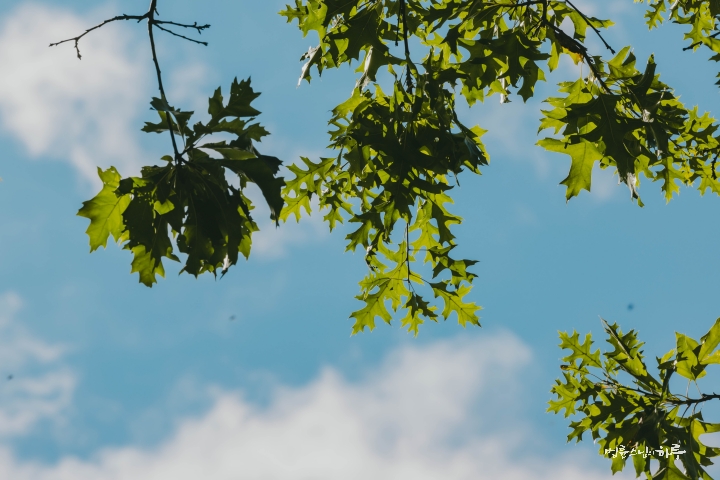
After completing his morning practice and meditation, and having breakfast, Sunim departed from the Seattle Jungto Retreat Center at 8 AM for Vancouver.
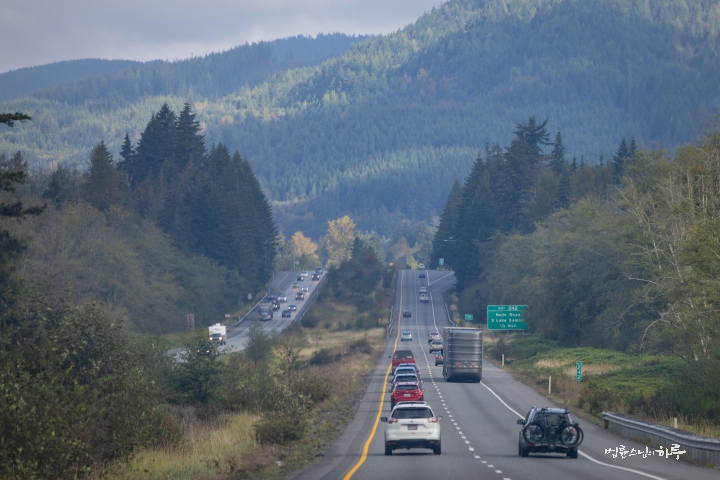
After driving for about 2 hours on Interstate 5, which runs through the northwest of the North American continent, we reached the Canadian border.
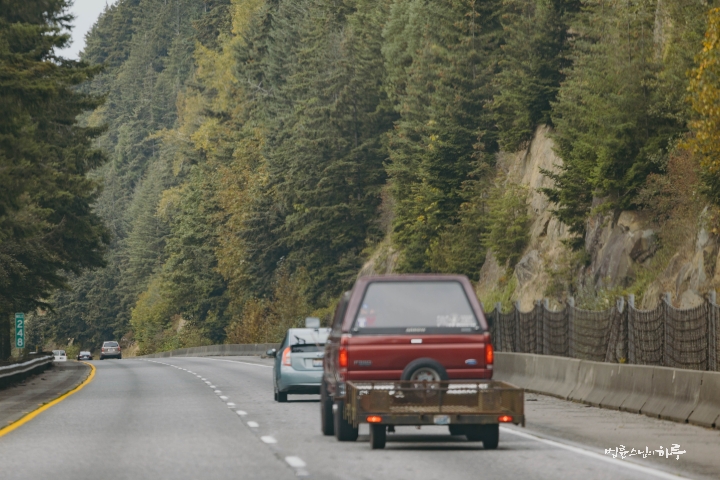
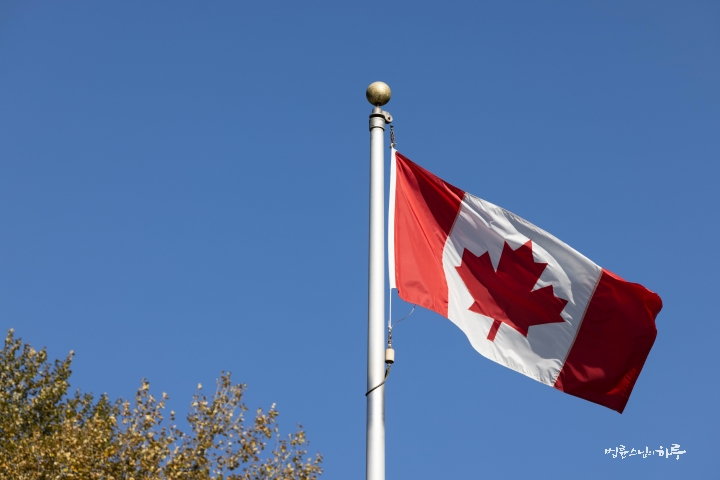
After crossing the border and traveling for another hour, we arrived in Vancouver at 10:50 AM. We had lunch at the home of Ms. Hyun-mi Kim, a Jungto Society member, and took a short rest while attending to some work.
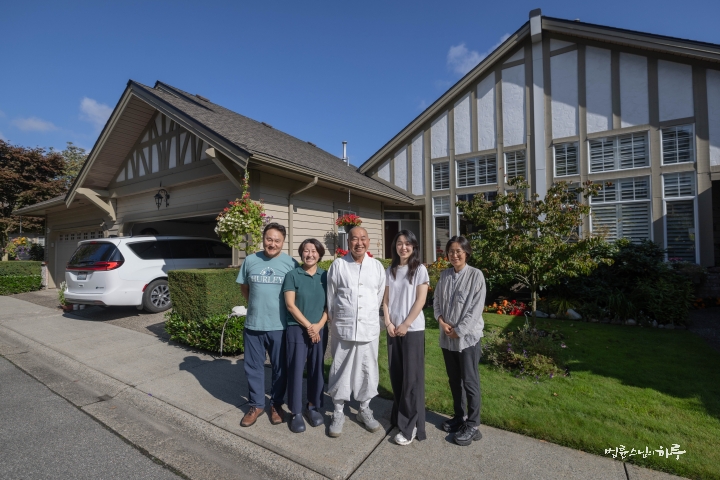
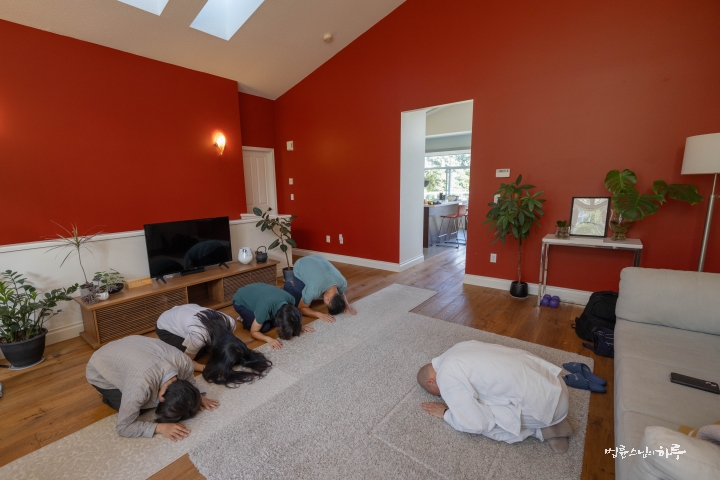
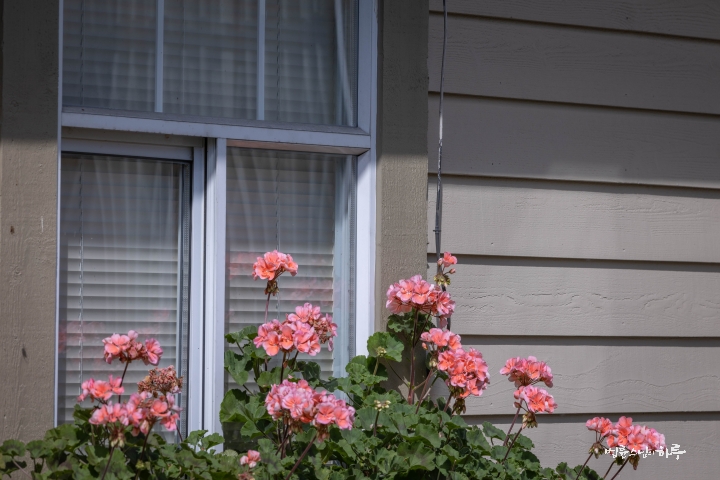
Autumn has arrived in Canada, making the weather very pleasant and cool. While leaves have already started to fall, beautiful flowers of various shapes and colors were still blooming in many places.
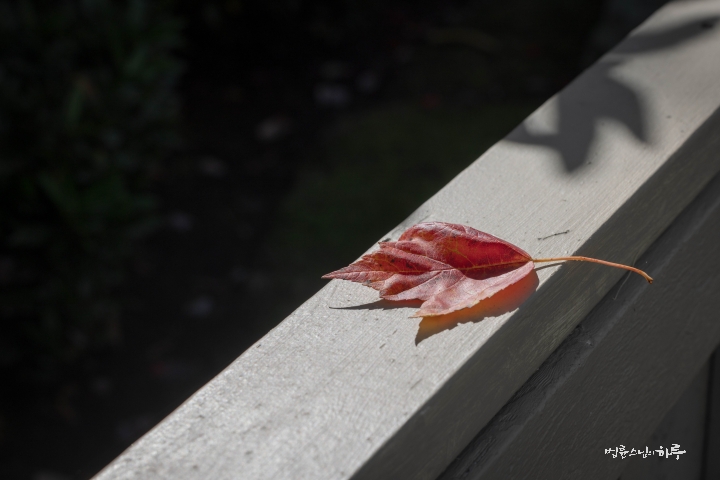
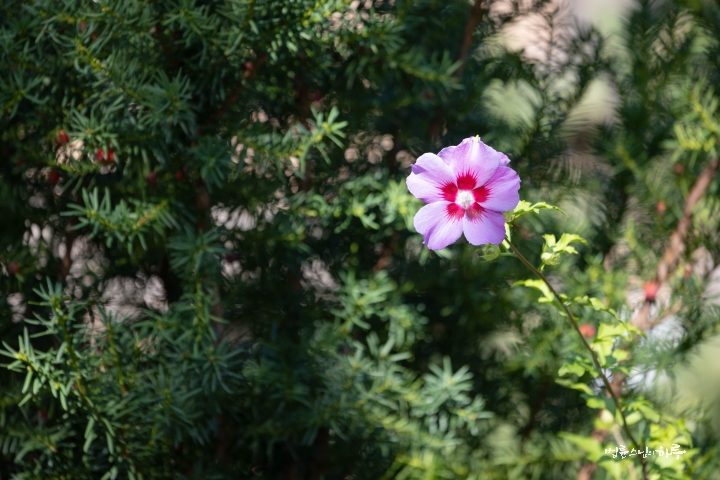
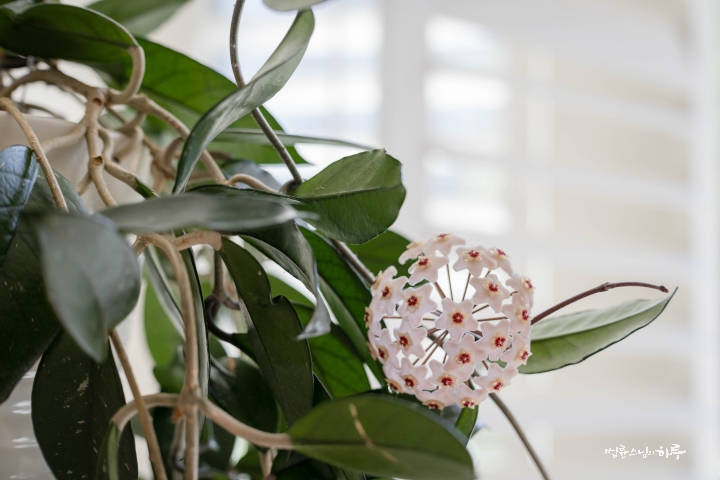
At 3 PM, we moved to the lecture venue. After a 50-minute drive, we arrived at the venue.
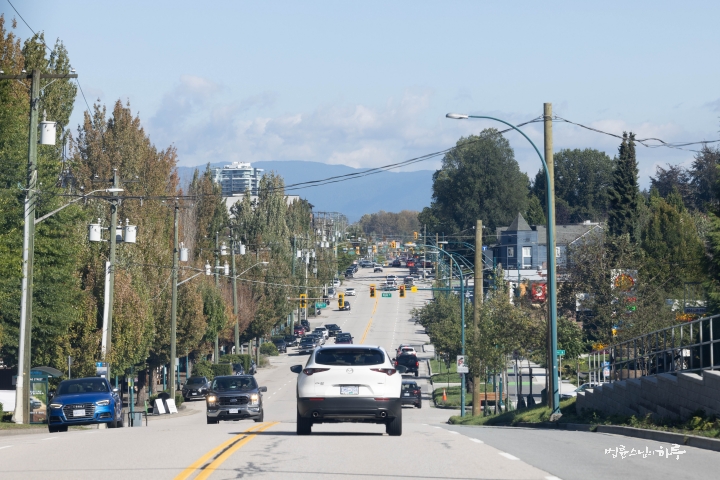
Today’s lecture is being held at the Inlet Theatre, a performing arts theater located in Port Moody, in downtown Vancouver.
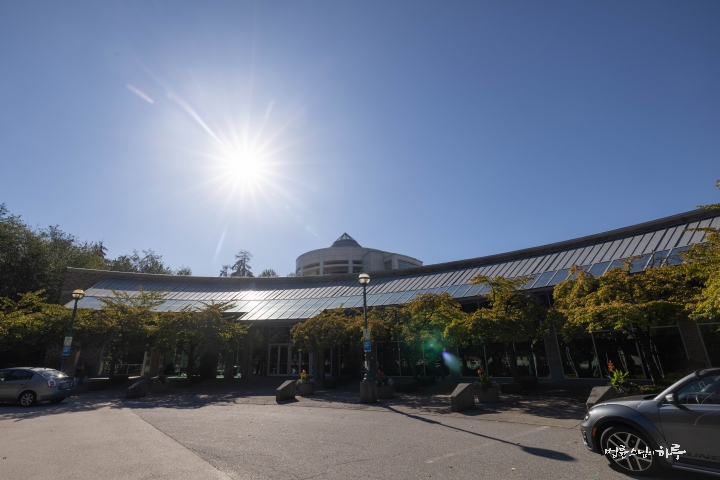
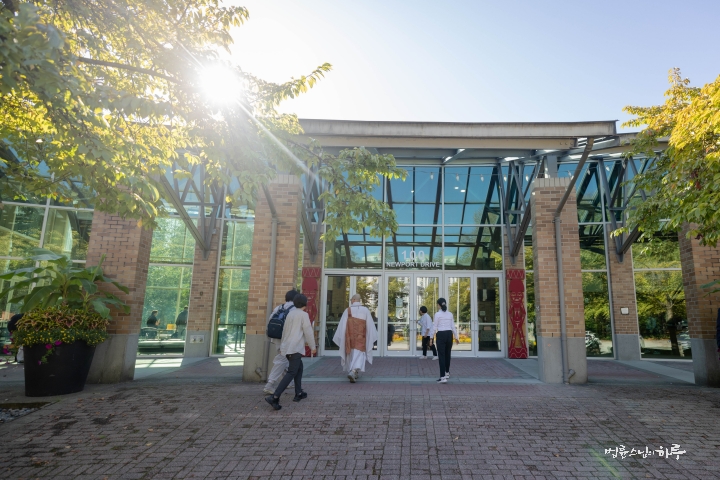
As Sunim arrived at the venue, about 30 volunteers were kindly greeting the attendees in various places. The lecture preparations were going smoothly with the cooperation of Jungto Society’s international branch and overseas branch volunteers.
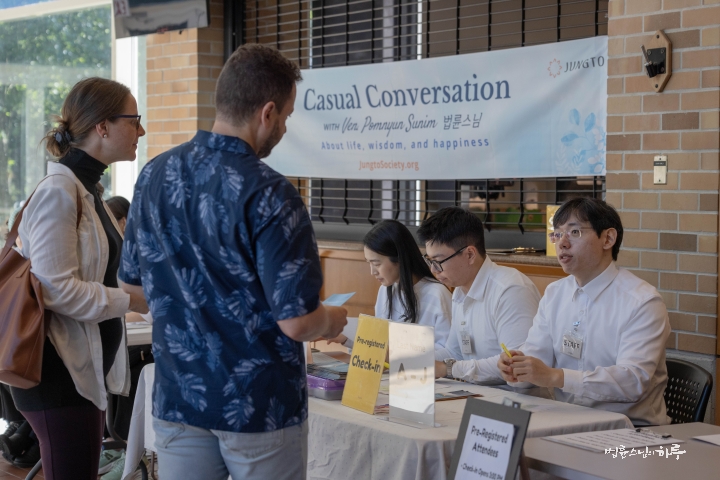
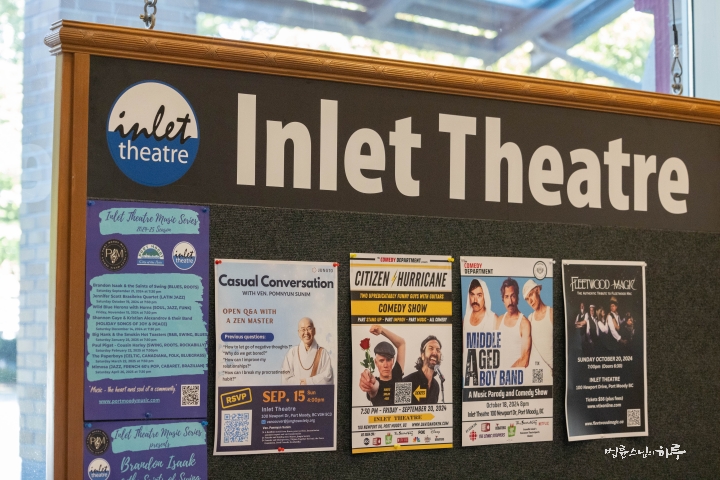
At 4 PM sharp, with all 200 seats filled, Sunim and Jason took the stage. A big round of applause erupted.
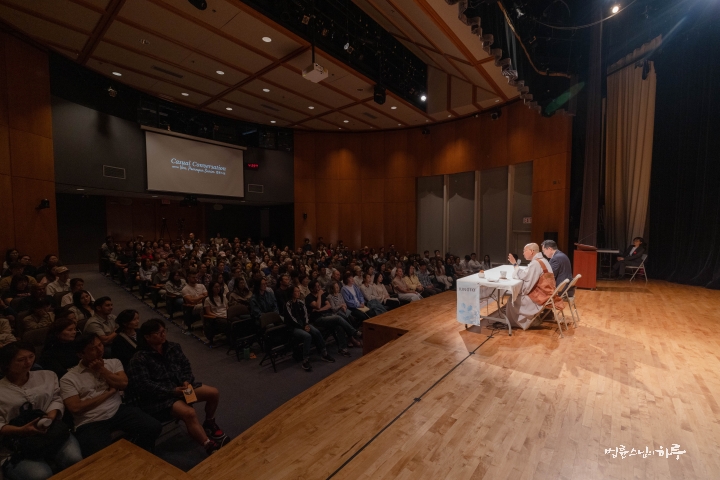
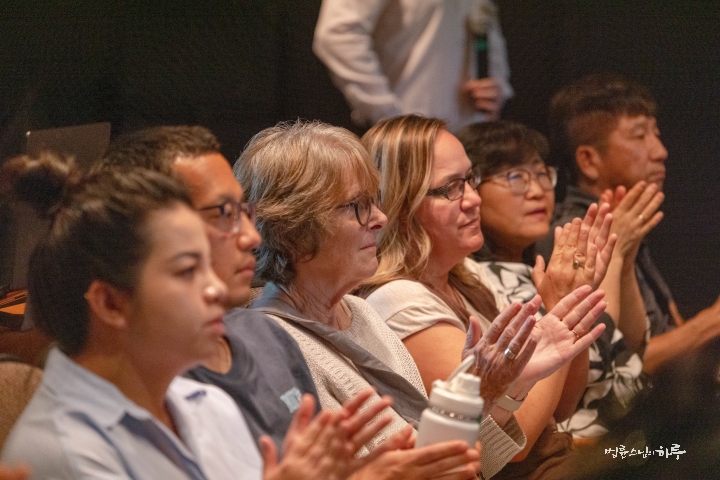
Sunim smiled and gave his opening remarks.
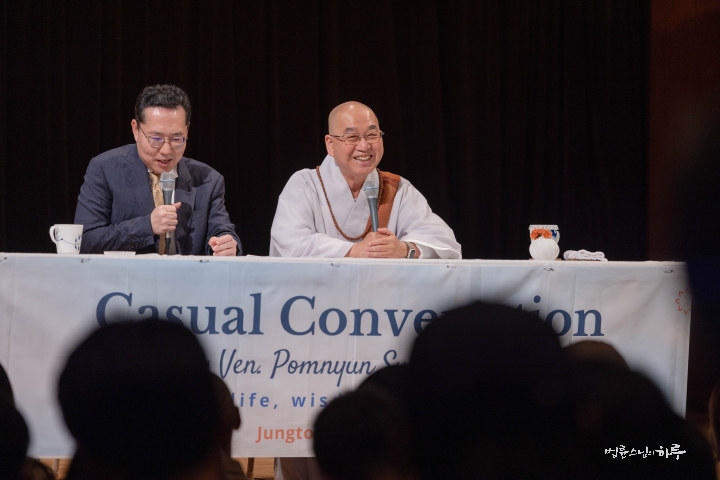
“Dharma Q&A is not a place to discuss intellectual knowledge. It’s a place where we can comfortably talk about our inner sufferings or doubts, as if talking to a friend. The Buddha and the people of his time had conversations like we are having today, sitting around comfortably, and the records of those conversations became the sutras. As later generations began to study these numerous records, Buddhism gradually became more knowledge-based and doctrinal, developing academically. As a result, some parts of it turned into a kind of philosophy exploring questions like ‘How was the world created?’ or ‘Is the world eternal?’ However, the Buddha remained silent on most of these questions. He didn’t comment on matters that weren’t directly related to the suffering we experience in our daily lives.
How Can We Live Happily Without Suffering?
Most people seek help from others when they face difficulties in life. As this practice developed, it became religion. Also, because of the fear of death, people became very interested in what happens after death. The desire to live more comfortably even after death further developed religion. However, the Buddha mostly remained silent on issues about what happens after death or whether God exists or not. Buddha’s concern was ‘Can I live without suffering now?’ If I’m suffering now, how can I be free from that suffering – this is the central issue of Buddhism. So today, I want to have a conversation with you on the topic of ‘How can we live freely and happily without suffering?’ We call this ‘practice.’
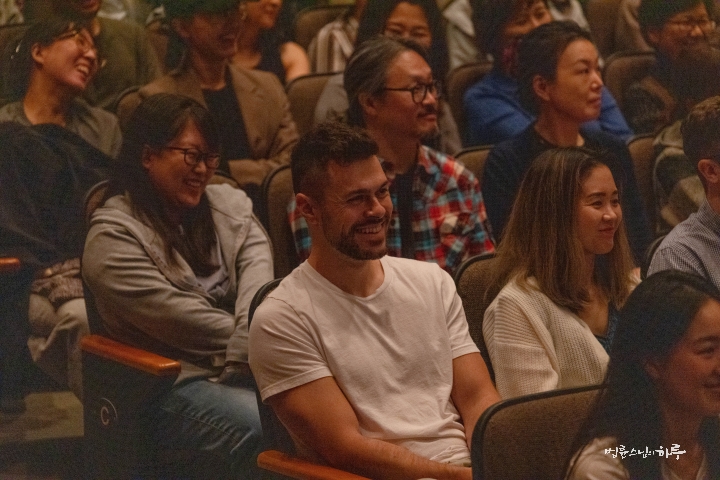
However, in reality, there are three types of Buddhism: Buddhism as a religion, Buddhism as a philosophy, and Buddhism as a practice. Today, I want to have a conversation with you about Buddhism as a practice, excluding Buddhism as a religion and Buddhism as a philosophy. Buddhism as a practice doesn’t necessarily need to be called Buddhism. So, please don’t think of this as a conversation about Buddhism. Instead, let’s have a conversation from the perspective of ‘How can we be free from suffering?’ and ‘How can we be free from our anguish?'”
Then, anyone could raise their hand and ask about their concerns. Over the course of two hours, seven people were able to have a conversation with Sunim. One of them asked for Sunim’s advice on how to deal with feeling empty, saying they couldn’t find meaning in life.
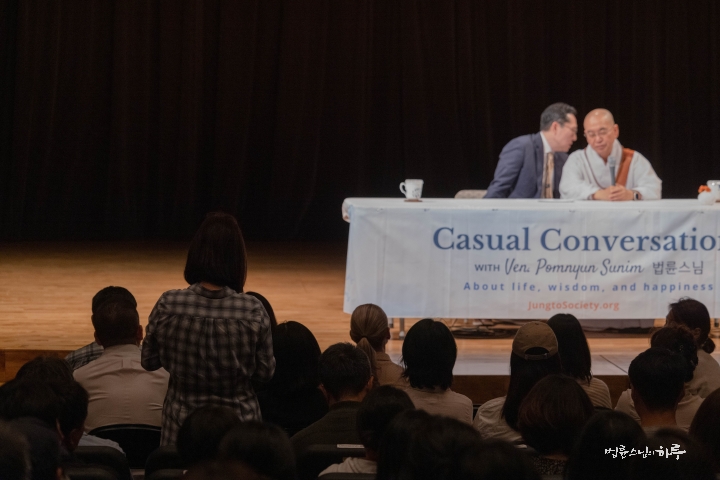
How Can We Find Meaning When Life Feels Empty?
“Originally, life has no meaning and is empty, so it’s not a problem if you feel that life is empty or if you can’t find meaning in life.
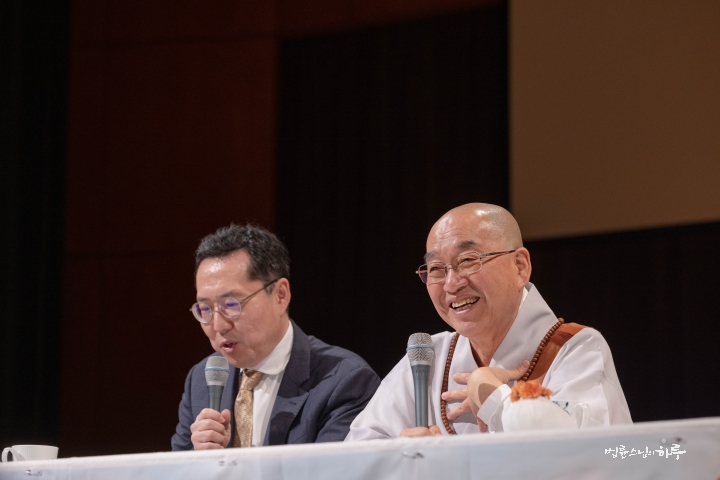
What meaning is there in a squirrel living in the mountains climbing up and down trees, jumping here and there? Similarly, there is no inherent meaning in human life. However, humans create meaning for their lives. We assign many meanings to life and live for them. The values that people assign meaning to differ from person to person. That’s why everyone lives a different life.
No one is born with a predetermined meaning or mission in life. Each person assigns meaning, and that’s how meaning emerges. For example, if someone is a Christian believer or a Catholic priest, they might say they have a mission given by God, and this allows them to pursue their faith life diligently. If they believe they’ve been given meaning by God, they might be able to stay on that path longer. If someone is a Buddhist monk, they might believe they were given a mission from their previous life to do this work in this world, which allows them to steadfastly follow the path of a monk.
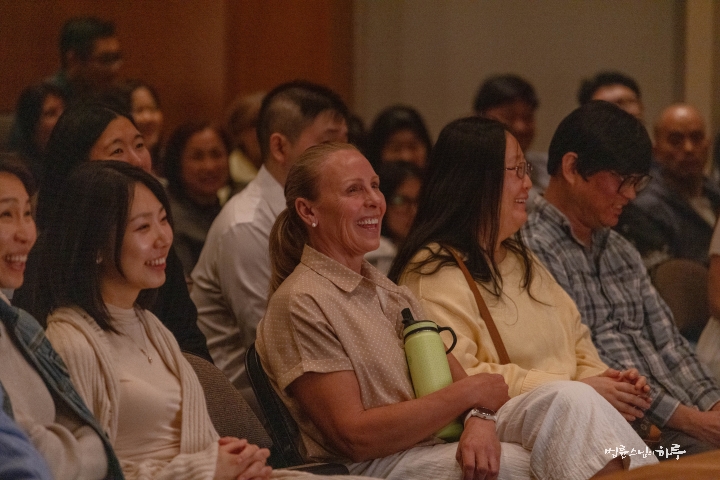
My teacher also told me, “You were born to walk the path of a monk.” He said, “Your idea of becoming a scientist is unnecessary. You should live according to the meaning of why you were born into this world.” He gave me the mission of turning the wheel of Dharma while traveling around the world, and gave me the Dharma name ‘Pomnyun’ (法輪, meaning ‘Dharma wheel’). So, was I really born into this world with the purpose of spreading the Buddha’s teachings from my previous life? If I believe so, I will live that way, and if I don’t believe it, I won’t. Since my teacher gave me that meaning, I thought that if I had to give some meaning to life anyway, that was fine, so I’ve been walking the path of a monk until now.
However, when you think about it carefully, meaning is something you create yourself. If you think there’s no meaning, you can live without it, and if you’re bored, you can create a meaning and live by it. This is different from wandering because life has no meaning. A rabbit doesn’t wander because its life has no meaning. Wandering means that you’re roaming around following your desires. It’s good that you can’t find meaning in life. Because if you need to, you can now choose one from various meanings. Isn’t it great to have a wide range of choices? Life is originally empty. So it’s not a problem at all.
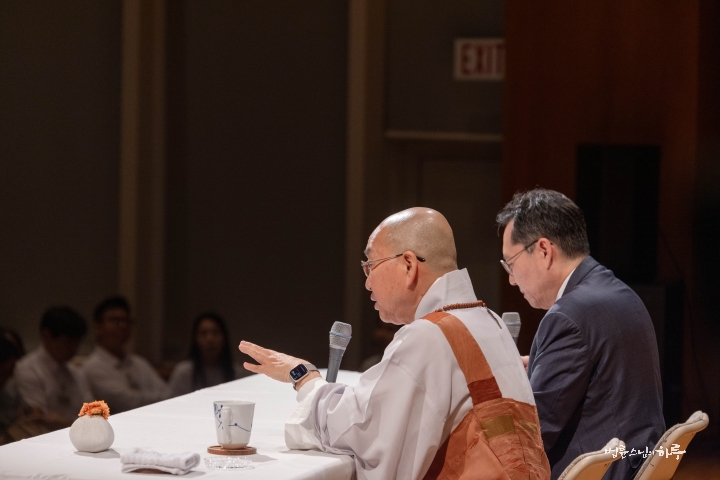
You teach children to have dreams, right? Because of such education, many children come to me saying, “Sunim, I don’t have a dream.” Whenever this happens, I tell the children:
“It’s good to have no dream. People with clear dreams suffer when they can’t achieve them, but you have no dream, so you won’t suffer from not achieving it. There’s no problem at all. Rather, it’s better because you have more choices, so don’t worry.”
When I tell them this, children’s hearts become lighter. Originally, there are no dreams. If you want to have a dream, you can have one.
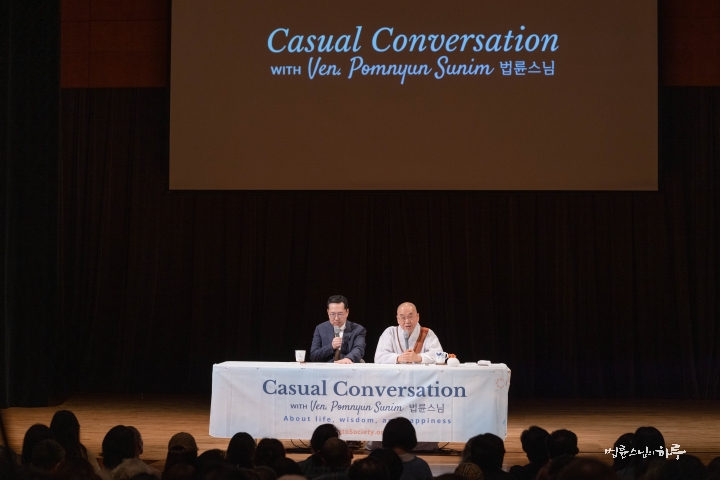
“What do you think? We are too bound by artificial constructs. People are naturally meant to meet in various ways. They are also meant to part ways. However, because we hold the belief that once we meet someone, we shouldn’t part, we become sad when the moment of separation comes. Is parting bad? In today’s wonderful world, isn’t it good to meet various people? When one person leaves, it allows us to meet others. If we push someone away to meet another, we make the other person sad. But when they leave on their own, isn’t that great? So, even if we part ways, there’s no problem. You’re creating problems out of something that isn’t problematic and suffering because of it.”
“Thank you. I understand.”
The questions continued.
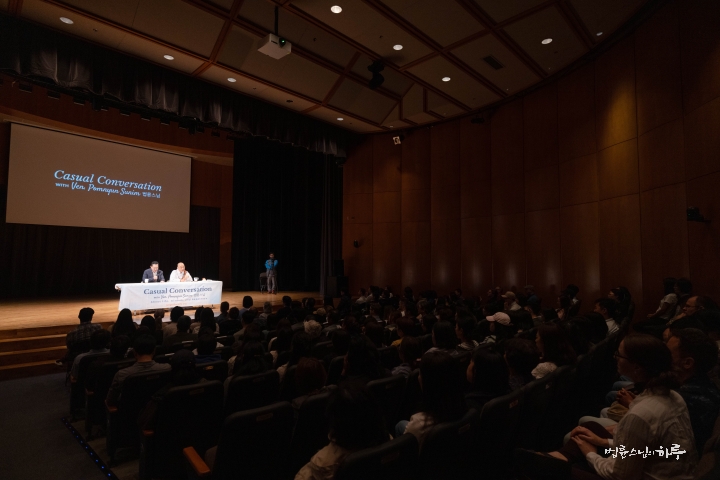
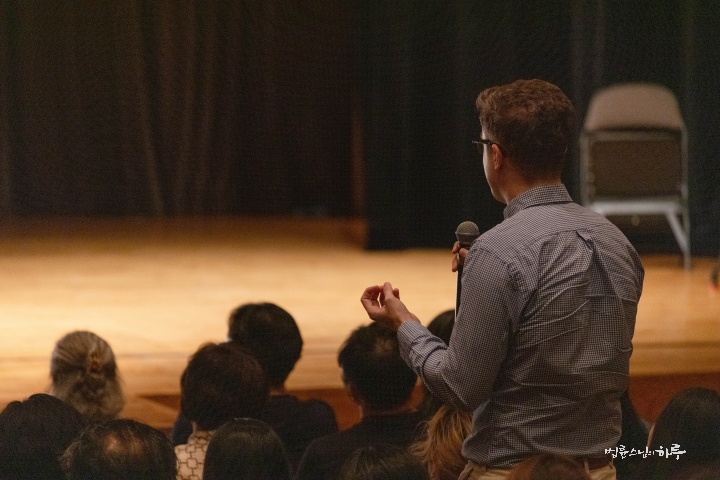
I’m struggling with anxiety about being fired from my job. How can I overcome this?
How much attention and practice is needed to control unconscious habits that arise?
It’s difficult to maintain a good relationship with my daughter.
I’m studying art but I’m not confident if I should continue.
Do you believe in reincarnation? I often have dreams related to reincarnation.
The last questioner first expressed gratitude to Sunim.
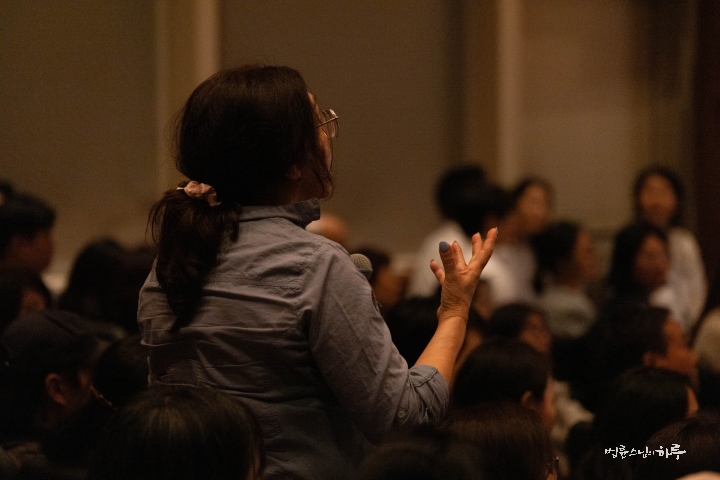
“I am so grateful for your wisdom and all the lectures. And can I give my child a chance to say hi to you?”
When the child said “Hello,” Sunim responded with “Hello” as well. Then, the questioner proceeded to ask Sunim a question.
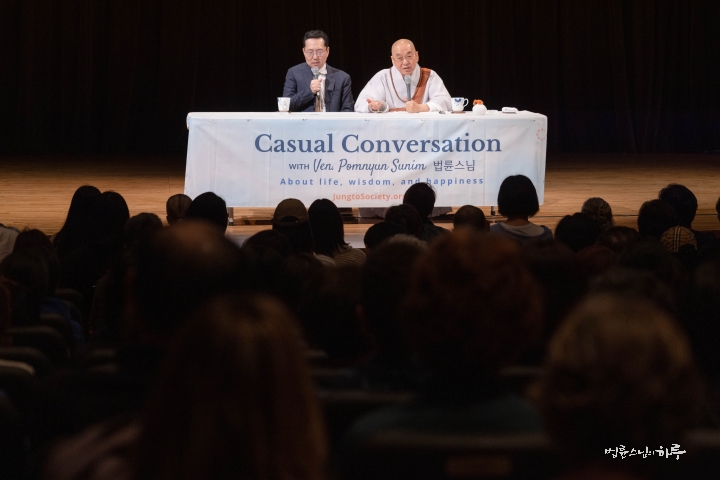
How Can I Repay You for Saving Me from Suffering?
“I’m grateful that I was able to help. The way to repay the help is to assist others who are in difficulty, just as you were. Helping them is the same as helping me. I lack nothing in my life. What I want to do is help people who are struggling, either mentally or materially. If you do such work where you live, it’s the same as doing what I want to do.
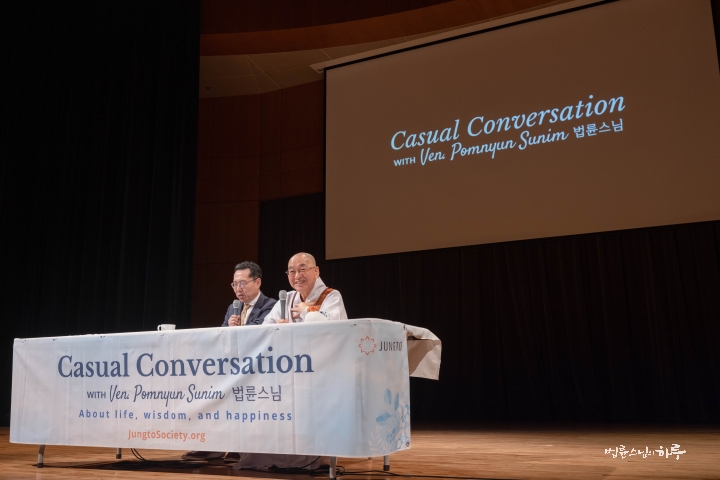
However, while I don’t have any specific fears, there are some concerns. First, the risk of war breaking out in South Korea, where I live, is increasing. If war occurs, many people will die, and property will be destroyed. Both sides of the Korean peninsula have deployed tremendous advanced weapons. South Korea has superior conventional weapons, while North Korea even has nuclear weapons. Although North Korea is much weaker in various aspects of power, it has enough strength to cause significant damage to South Korea. Moreover, South Korea has many nuclear power plants, and if they were attacked, the radiation risk would be enormous. Korea originally had no resources, but through education, it developed technology to reach where it is today. If large companies like Hyundai Motor, Samsung Electronics, and LG Electronics are destroyed by war, it would be very difficult for Korea to recover. Because the territory is small, there’s a risk of total destruction. It’s not about winning or losing. War must be avoided.
However, people misunderstand that avoiding war means fearing the opponent. They respond emotionally, thinking ‘we need to teach them a lesson,’ which I believe is foolish. So, I’m thinking a lot about ‘how to calm their emotions and prevent war?’ This is not just an issue between North and South Korea. It’s part of the global power competition between the United States and China. Conflicts always arise first in the periphery where two great powers clash. As the risk of war is increasing both internally and externally, rather than fearing it, I’m researching how to prevent it.
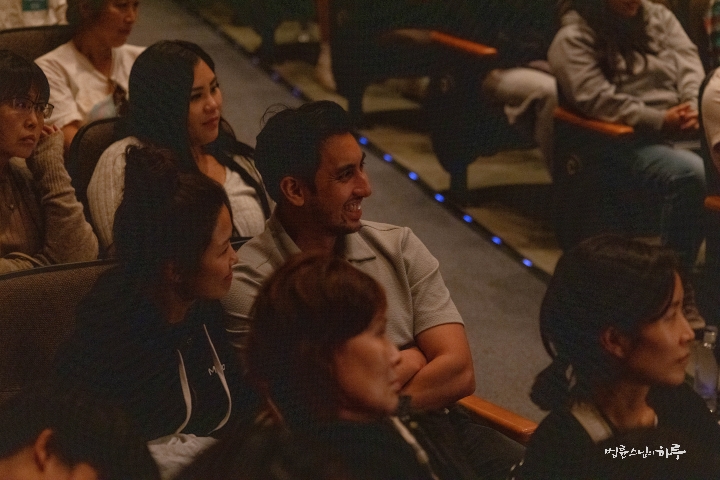
Secondly, there’s the issue of humanity’s response to the climate crisis. The 1.2 billion people in OECD countries have caused the climate crisis through reckless development, which they consider the advancement of civilization. Now China and India are following this path. Both countries have populations of 1.4 billion each. If these two countries develop like Western nations, the current climate crisis will be amplified threefold.
From my travels around the world, I’ve observed that every country and every person is following this path. This is happening despite the visible side effects of climate change, such as lowering river levels, seawater intrusion into rivers, and drying springs. Moreover, beyond these known issues, signs of change are already appearing in many areas. We really need to stop now. It might even be too late. However, what we can do is to stop here. Yet, we’re not stopping; instead, we’re competing even faster. So, “How can we stop this and make it sustainable?” is a major challenge for me. Personally, I think it will be difficult for humanity to stop this trend. We must appeal and strive to stop, but in reality, it will be challenging to do so. Therefore, my interest lies more in “What will happen next? What alternatives can we create?” I believe we need to create a model in advance that humanity can follow when an alternative is needed after this crisis passes. So, although there might not be much interest now, I plan to create a model that people can look to and think, “Ah, there’s also this path,” when faced with a crisis.
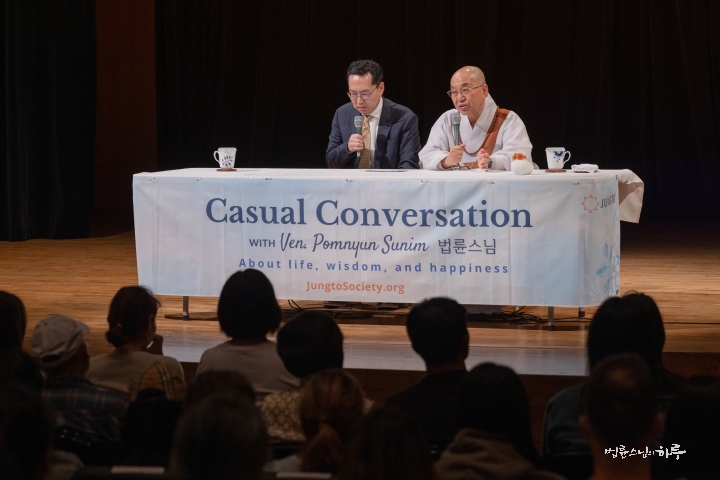
However, people are living in the ‘present’. Not only are future generations important, but those living now are also important. Nearly a billion people on Earth are still living in absolute poverty, and we need to help them maintain a minimal standard of living. In the Bible, Jesus said, “Whatever you did for one of the least of these brothers and sisters of mine, you did for me.” These “least” are described in six ways. First, those who are thirsty, meaning people who lack water. Second, those who are hungry, referring to people in a state of famine. Third, those who are sick but unable to receive treatment. Fourth, those who are naked, meaning people who lack clothing. Fifth, strangers, which refers to refugees. Sixth, those who are in prison. This means people who are bound for various unjust reasons. Jesus said that whatever we do for these people is as if we’re doing it for Him. There are still nearly a billion people on this planet who fall into these six categories. If we turn our backs on them, it’s the same as turning our backs on God or Jesus. It’s like ignoring the path to heaven that you want to take.
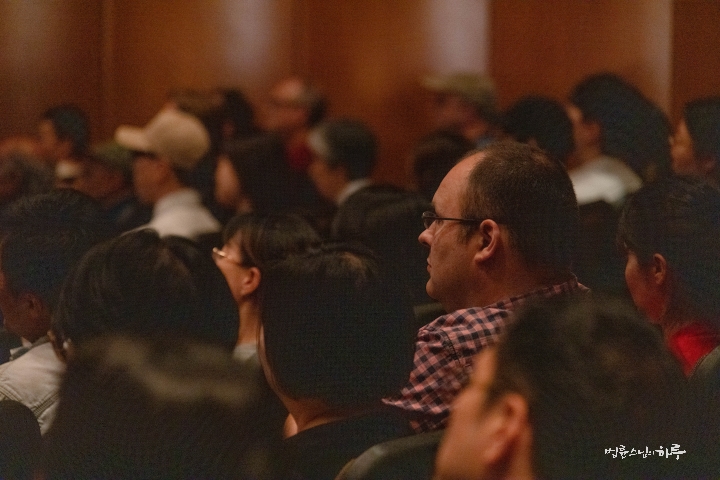
Therefore, we need to help these people. This is not a task for the future, but something we need to do now. It’s necessary to share a little of the blessings you have. If you have enough water, you should provide some for those who lack it. If you eat well, you should give even a spoonful of rice to those who are hungry. If you’re healthy or can receive sufficient medical treatment, you should donate medicine for those who can’t get treatment. If you have enough clothes, you should donate some to those who don’t have even one set. If you live in a safe place, you should help those who have become refugees, living in tents and on the streets after leaving their homes. If we live freely, we should make efforts for the freedom of those who are unjustly bound in dictatorships or prisons.
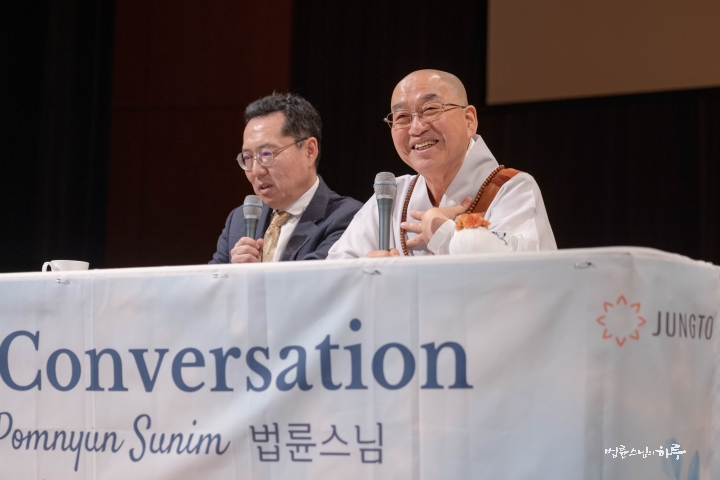
“I don’t agree with using such things for political purposes. However, I also don’t think we should turn a blind eye to this. It’s important to be aware that there are people living in such difficult conditions in our time. Rather than feeling guilty for not being able to help these people, it’s more important to take even small actions right now. I’m interested in these kinds of issues. I hope you and your child will grow up to participate, even in a small way, in such efforts.”
“Thank you.”
The lecture concluded with a big round of applause.
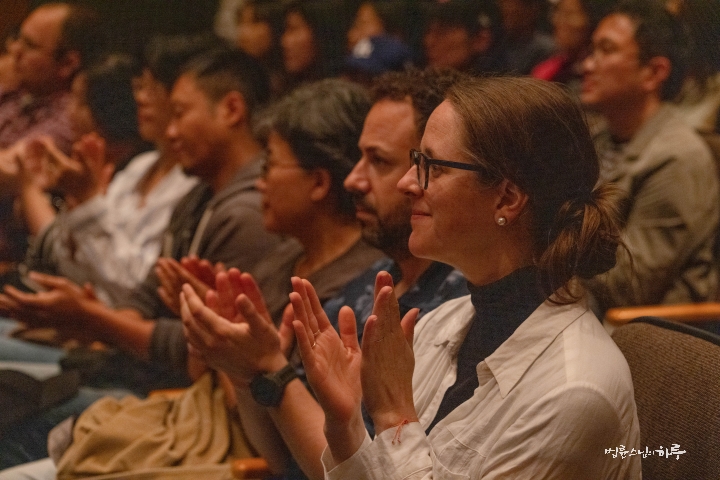
Sunim came down from the stage and greeted the questioners and attendees, shaking hands with them.
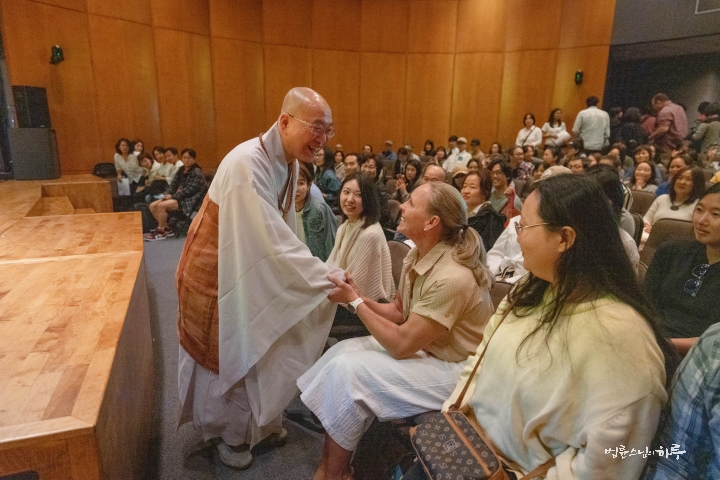
The son of the person who asked the last question ran up to Sunim to greet him. He was quite a mischievous boy. It was heartening to see him growing up healthy. Even though Sunim offered to take a commemorative photo, the child kept making playful expressions.
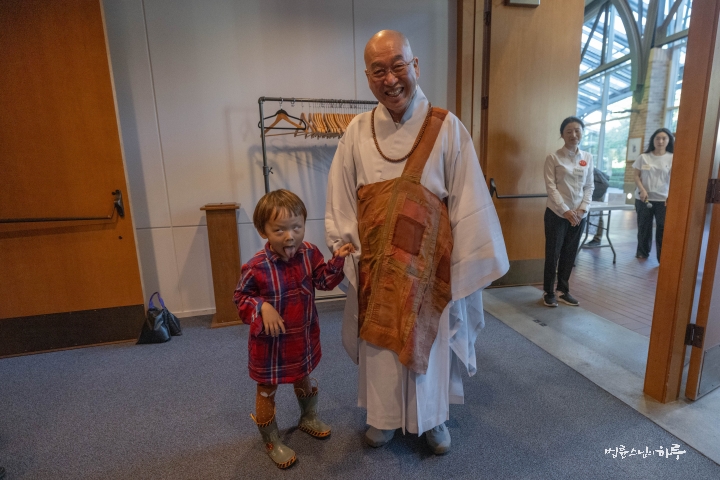
After all the attendees had left the lecture hall, Sunim took a group photo with the volunteers who had prepared for the lecture on stage.
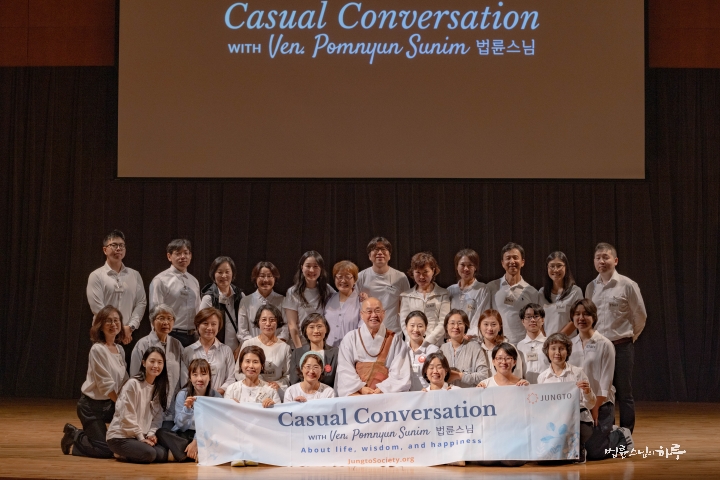
“Vancouver!”
Sunim gifted books to Ms. Kim Sun-hee and Ms. Kim Hyun-mi, who oversaw the lecture, and took separate photos with the students who had graduated from the Jungto Dharma School, the English Jungto Buddhism course.
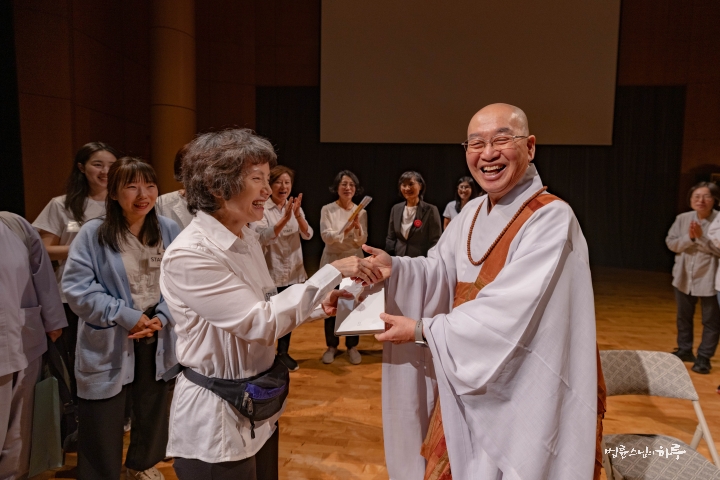
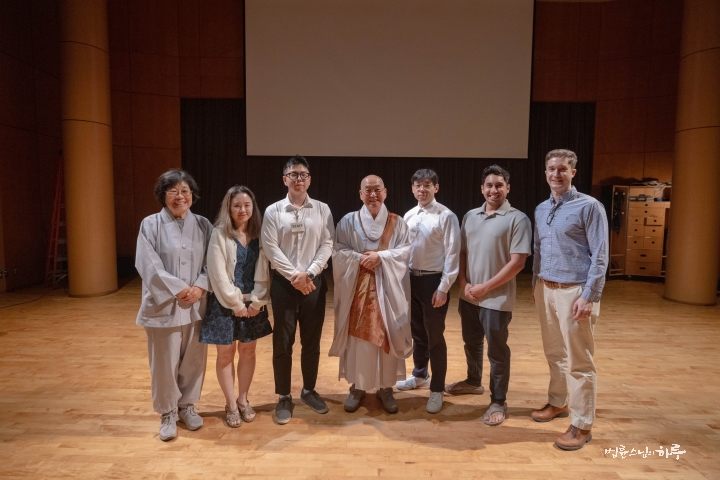
The volunteers had a heart-to-heart talk with Venerable Myodeok, Venerable Myomyeong, and Venerable Bophae, while Sunim thanked the volunteers and left the lecture hall.
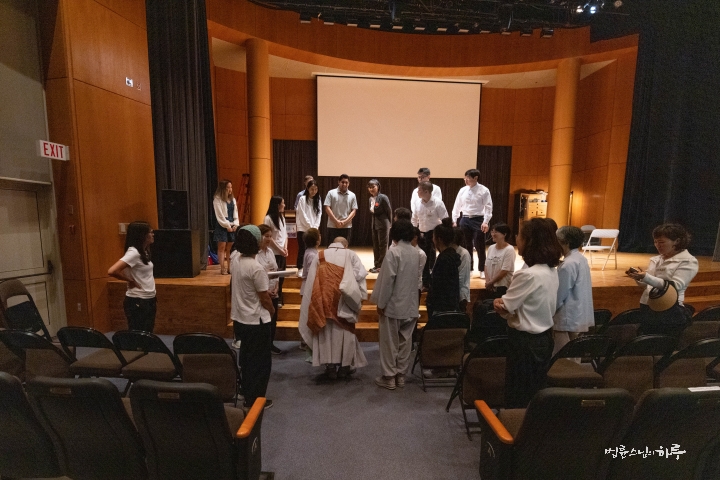
Departing from Vancouver at 6:10 PM, we drove for another 3 hours and 20 minutes. The sun set outside the car window during the journey.
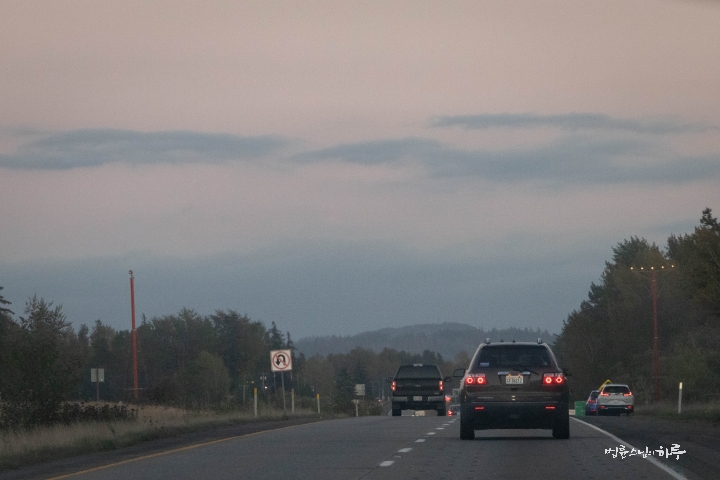
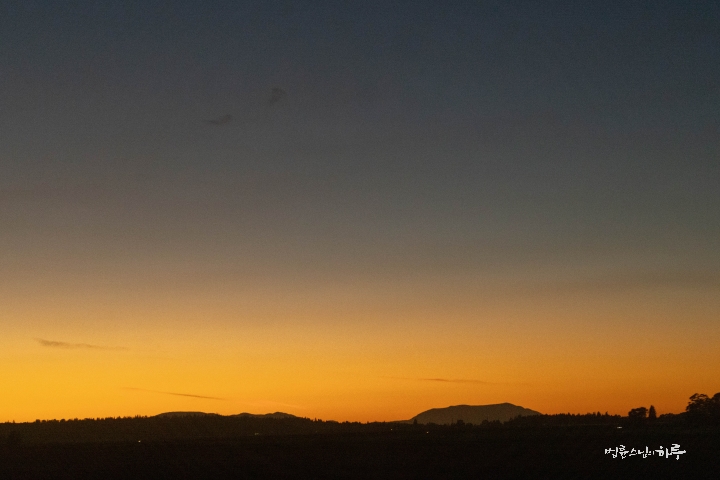
After crossing the Canadian border, we arrived at the Seattle Jungto Retreat Center in the United States at 9:30 PM. Sunim had a late dinner and concluded the day’s activities.
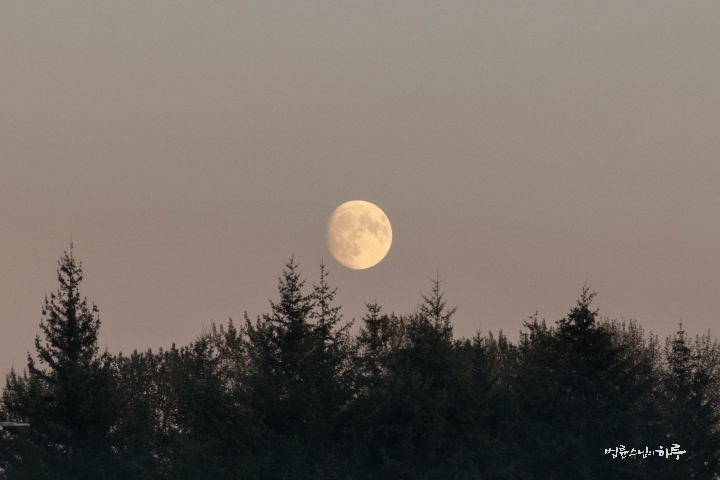
Tomorrow, Sunim will move to Seattle airport early in the morning, fly to San Francisco airport, give an invited lecture at an IT company in the afternoon, and in the evening, conduct a Dharma Q&A session with English interpretation for local Americans in San Jose.




